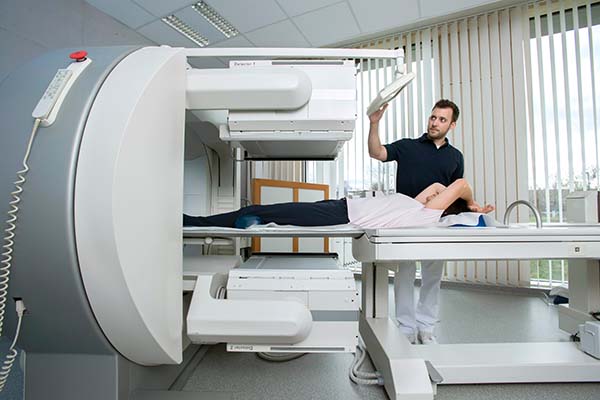Nuclear Cardiology
Looking for Myocardial Perfusion Imaging (MPI)? At the WELL Health Clinic Network, we provide quick and convenient access to the care you need. Our dedicated healthcare providers are committed to delivering exceptional care, assisting you every step of the way.

Nuclear Cardiology Near You
Your Nuclear Cardiology Questions Answered
What is a nuclear stress test?
Myocardial Perfusion Imaging (MPI), also known as a Nuclear Stress Test, determines how well the coronary arteries deliver blood to your heart and identify areas of the heart muscle that aren’t getting enough blood flow.
If the test shows a lack of blood flow during exercise or stress but is normal at rest, it could mean an artery that carries blood to your heart is narrowed or blocked. If the test shows a lack of blood flow to a portion of the heart muscle during exercise or stress and at rest, it could mean that your heart muscle is scarred, possibly from a past heart attack.
Why would my doctor recommend a nuclear stress test?
MPI is a valuable tool for patients experiencing chest discomfort, as it helps determine if the discomfort stems from insufficient blood flow to the heart muscle due to narrowed or blocked arteries (angina). Although MPI doesn’t directly visualize the heart arteries, it provides your doctor with a reliable assessment of any blockages and their extent.
How do I prepare for a nuclear stress test?
- Please fast (except water) for 4 hours before the test.
- If you are an insulin-dependent diabetic, take your insulin with a light meal 2 hours before the test.
- Avoid all caffeine products for 24 hours before the test, including tea, coffee, decaffeinated tea/coffee, pop, chocolate, Tylenol 2 & 3, and other medications containing caffeine.
- Wear loose-fitting clothing, such as a t-shirt, track pants, and athletic shoes.
- Bring a list of all current prescription medications and consult your physician about discontinuing any heart medications, such as Beta-Blockers like Metoprolol or Atenolol, as well as Calcium Channel Blockers like Diltiazem or Verapamil.
- Refrain from taking erectile dysfunction medications, such as Viagra, Cialis, Levitra, etc., for 48 hours before the test.
- If you are pregnant, there is a possibility of pregnancy, or you’re breastfeeding, Nuclear Medicine Stress Testing may not be appropriate for you at this time. Please consult with your physician.
What can I expect during and after a nuclear stress test?
During your nuclear stress test
The test consists of two parts, which you may complete in one or two days.
Rest Study: 1.5 – 2 hours
During this portion of the test, the technologist will administer a small amount of radioactive tracer via intravenous injection. Your bloodstream carries the tracer to your heart. There are no side effects with this injection.
Around 15-45 minutes after the injection, the technologist will use a special gamma camera to take pictures of your heart for approximately 20 minutes. During the test, you may need to sit in a specially designed-chair or lie on a bed. It’s important to remain still during this time to avoid blurring the images.
Stress Study: 2-2.5 Hours
- The technologist will place ECG electrodes on your chest to monitor your heart rhythm and insert an intravenous line in your arm or hand. You will begin to exercise on a treadmill, and your heart rate and blood pressure will rise. These are normal responses and are monitored with your ECG.
- If you cannot exercise adequately on a treadmill, a drug called Persantine can achieve similar results by mimicking the effects of exercise.
- Once you have reached your maximum level of exercise, the technologist will administer a small amount of radioactive tracer, and you will continue exercising for an additional 1-2 minutes. If blood flow to your heart is limited, then the amount of tracer in your heart is reduced.
- A set of pictures must be taken after the stress test to compare to the resting images and assess the amount of blood supply to the heart at rest and during exercise. Once the stress test is complete, you will wait approximately 15-45 minutes for imaging to begin.
- The wait time may vary based on individual characteristics to best optimize image quality. Your technologist will advise how long you will be waiting before images.
After your nuclear stress test
You will be able to return to your normal activities when the test is complete, unless your physician or technician tells you otherwise. You can drive after the test. If you are travelling by plane, train or crossing the border within one week after your test, please inform the technologist.
For more information about our Nuclear Cardiology (MPI) services in Ontario, visit myhealthcentre.ca
How do I find a nuclear stress test near me?
You can use the WELL Clinics website to quickly find a nuclear cardiology clinic near you. If you have a referral or requisition, select the button below to book a nuclear cardiology (MPI) appointment.
If you don’t have a referral or requisition but would like to request an MPI appointment, book with your family doctor. Or use our clinic map to find a primary care clinic or telehealth service and request a referral or requisition.





